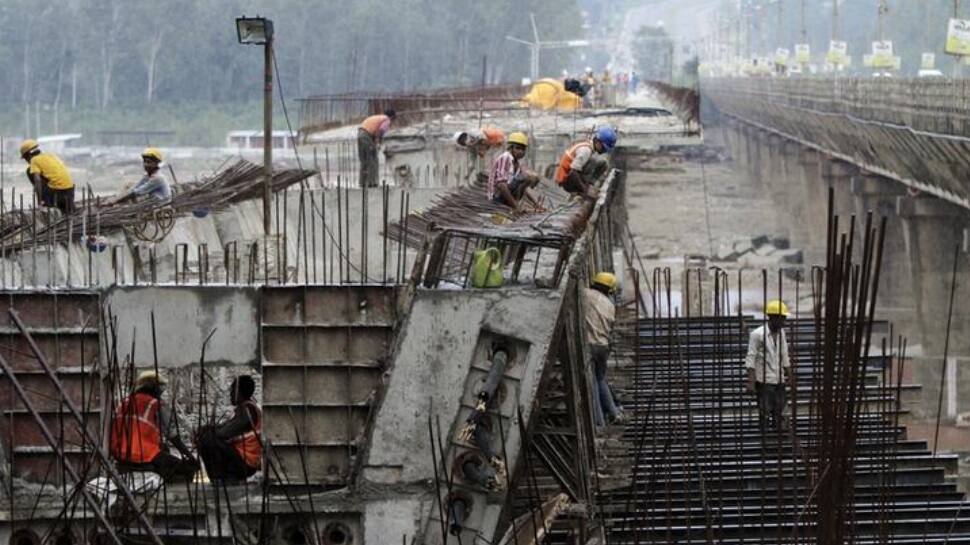New Delhi: The World Bank on Wednesday said that Indian economy is "credible" and expected to grow at 7.3 percent in FY 2018-19 and 7.5 percent in FY 2019-20 driven by private consumption, investment, and exports.
For the current financial year ending on March 31, the Washington-based multi-lateral funding agency has projected the economy to grow at 6.7 percent.
India's growth has been credible over the long run with growth averaging at 7 percent in the last decade, it said. "India's GDP growth saw a temporary dip in the last two quarters of 2016-17 and the first quarter of 2017-18 due to demonetisation and disruptions surrounding the initial implementation of GST (Goods and Services Tax)," World Bank said in its India Development Update.
"The GDP growth is projected to reach 6.7 percent in 2017-18 and accelerate to 7.3 percent and 7.5 percent in 2018-19 and 2019-20 respectively," it said.
Services will continue to remain the main driver of economic growth, it said. Industrial activity is also poised to grow, with manufacturing expected to accelerate following the implementation of GST, it said, adding that agriculture is likely growing at its long-term average growth rate.
"Steadily and slowly, India has been growing. It's a steady growth, volatility has decreased, the growth is driven by one factor unlike China by exports. India's growth is far more diversified through investment, private consumption and exports," said Junaid Ahmad, World Bank Country Director in India while talking to reporters here.
The report observed however that a growth of over 8 percent will require "continued reform and a widening of their scope" aimed at resolving issues related to credit and investment, and enhancing competitiveness of exports.
"The Indian economy is likely to recover from the impact of demonetisation and the GST, and growth should revert slowly to a level consistent with its proximate factors — that is, to about 7.5 percent a year," the report said.
In November 2016, the Modi government had scrapped high value currency notes of Rs 500 and Rs 1,000 in a bid to check black money, among others.
Later, India implemented its biggest indirect tax reform — Goods and Services Tax (GST). Both of these initiatives had impacted the economic activities in the country in short run.
India's economic growth had slipped to a three year low of 5.7 percent in April-June quarter of the current financial year, though it recovered in the subsequent quarters.
The economy is expected to grow at 6.6 percent in the current fiscal ending March 31, as per the second advanced estimates of the Central Statistics Office (CSO), compared to 7.1 percent in 2016-17. The earlier estimate was 6.5 percent.
The Economic Survey tabled in Parliament has projected a growth rate of 7 to 7.5 percent in the 2018-19 financial year.
The World Bank report further said that accelerating the growth rate will also require continued integration into global economy.It pitches for making growth more inclusive and enhancing the effectiveness of the Indian public sector.
Growth at higher levels would require support from global economy and reversal in the declining trends in investment, credit and exports, said the World Bank update.
Maintaining the hard-won macroeconomic stability, a definitive and durable solution to the banking sector issues, realisation of the expected growth and fiscal dividend from the GST and regaining the momentum on an unfinished structural reform agenda are key components of this, it said.
"India's long-term growth has become more steady, stable, diversified and resilient.
"In the long-run, for higher growth to be sustainable and inclusive, India needs to use land and water, which are increasingly becoming scarce resources, more productivity, make growth more inclusive, and strengthen its public sector to meet the challenges of a fast-growing, globalising and increasingly middle-class economy," Ahmad said.
The World Bank country framework partnership "sets the tone of our investment commitment for coming five years. Today we are putting in approximately $3.5 billion per year in various projects (in India). We expect to go to $4-4.5 billion", Ahmad added.
Poonam Gupta, the Lead Economist and the main author of the report said that durable revival in private investments and exports would be crucial for India achieving a sustained high growth of 8 percent and over.
"Resorting to countercyclical policies will not help spur sustained growth and India should not compromise its hard-earned fiscal discipline in order to accelerate growth," she said.
The World Bank update said it will be crucial for India to leverage on the global recovery to elevate its growth rate.
On the flip side, it said oil prices pose less of a risk for the Indian economy, the expected normalisation of monetary policy by the US and the other advanced economies are likely to tighten financing conditions.
(With PTI inputs)
















